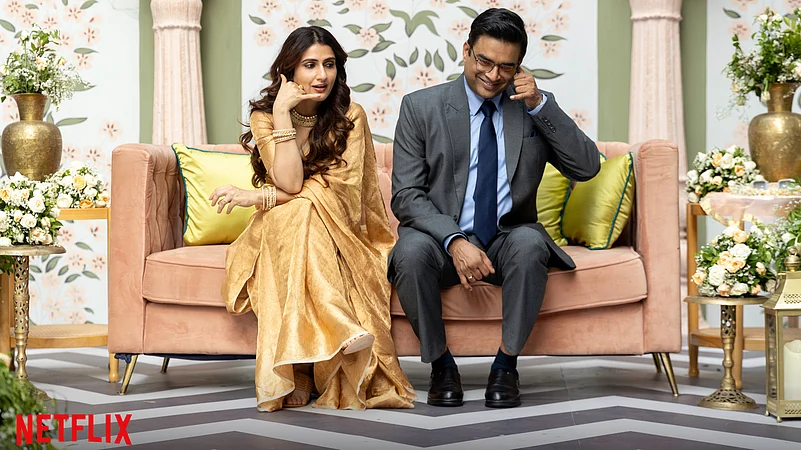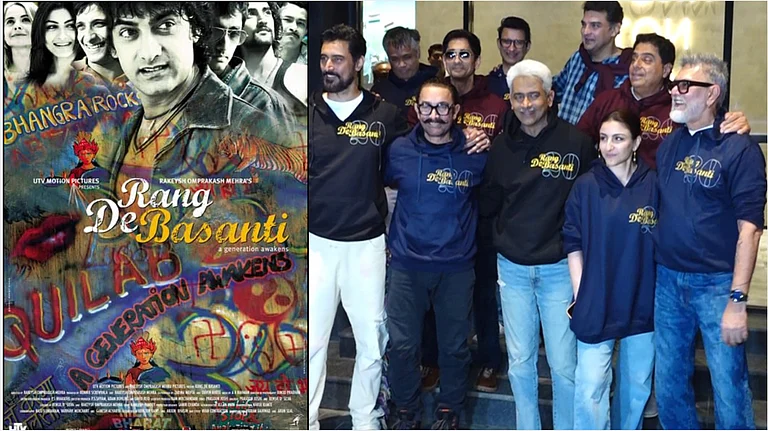Vivek Soni’s Netflix release Aap Jaisa Koi (2025) starring R. Madhavan and Fatima Sana Sheikh asks a simple question: can two individuals, shaped by opposing values, grow disenchanted with their own ideas of love? The answer isn’t straightforward. There’s a method to the madness—between knowing the exact recipe for perfect love, or an ideal cup of chai; and gradually learning to align your steps quietly with someone else’s, like a slow dance honed over time.
R. Madhavan plays Shrirenu, a Jamshedpur-born man like himself—a shy and endearing Sanskrit teacher in his early 40s yearning for a romantic connection. Madhavan played a similar role in Anand L.Rai’s Tanu Weds Manu (2011), as a man seeking love after being single for twelve years. There too, he unexpectedly glimpses it in the possibility of an arranged marriage, until everything unravels. Running on a familiar story tangent as Steve Carell’s The 40-Year-Old Virgin (2005), Aap Jaisa Koi at first raises an uneasy concern—whether it’s heading toward validating the so-called “male loneliness epidemic.” But it quickly derails that expectation, veering into something far more unsettling and self-aware. Shrirenu remains trapped in school—first as the boy once rejected by a classmate, then as a teacher circling school corridors, emotionally tethered to the idea of an “old-school love” that never grew up with him. Seeking to fill the void, he cautiously reaches for connection—joining a dating app that guarantees anonymity, rationalising, “If they can’t see you, you won’t be scared of them”.

His paths cross with the bright-eyed French teacher Madhu (Fatima Sana Sheikh) who was last seen in Anurag Basu’s Metro… In Dino (2025) and popular films like Ludo (2020) & Dangal (2016). The charming next-door neighbour Joy (Shaheb Chatterjee) steps in as matchmaker, introducing her to Shrirenu’s family. Emerging from a well-read Bengali family, Madhu is also a young woman in her 30s, searching for lasting love. The trailer captures Shrirenu’s hesitant demeanour the moment he sees her for the first time. Faced with even a hint of connection, he questions Madhu’s interest in him, before even managing a simple hello. Madhu arrives as the perfect twist in the tale, accepting him for who he is, in all his fumbling glory and even calls him “epoustouflant” (breathtaking in French). Shrirenu & Madhu’s love unfolds gradually, then all at once—through quiet afternoons in parks and shared cups of steaming chai.
Laced with soulful original tracks like Jab Tu Sajan, Saare Jag Mein and Dhuan Dhuan, Aap Jaisa Koi is musically rich; so are its protagonists, who play the piano and sitar, respectively. Shot across Jamshedpur and Kolkata, the film captures the pulse of both cities—through their architecture, transport and the rhythm of the people flowing through them. Shrirenu’s home in Jamshedpur mirrors his family’s disposition, marked by a quiet solitude that seems to linger in each member. In contrast, Madhu’s home holds together a family that, though different in temperaments, coexists in harmony. The portrayal of Kolkata, though rooted in familiar visual tropes—Pujo festivities, glimpses of the Victoria Memorial, yellow taxis, and Indian Coffee House on College Street—still carries a rich, lived-in nostalgia that holds weight.

Shrirenu is undoubtedly an innocuous incel; one who even invites a degree of empathy. Yet his character is granted the visible dimension of relentless self-loathing and internalised misogyny that fuels his own isolation. Madhu is the polar opposite of Shrirenu— both ideologically and culturally. Yet she, too, is lonely in her own way. A remarkable line Shrirenu‘s friend (Namit Das) delivers initially in the story is quite noteworthy : “Loneliness is a killer, my friend”. On the same nerve, Soni’s film earnestly attempts to confront a touch-starved, romantically deprived section of a generation trying to protect itself from the chaotic missteps of modern-day dating.
Bhanu Tripathi (Manish Chaudhari) stands as the patriarch Shrirenu has revered throughout his life, while Kusum Bhabhi (Ayesha Raza) emerges as his trusted confidante, following his mother’s passing. Madhu shares a close bond with her grandmother, who provides a sense of grounding after her father’s death. These familial ties, intertwining and sometimes faltering in communication, reveal the deep-rooted values that both define and limit their openness to love. Characters in Aap Jaisa Koi seem to be written as plainly as cardboard-cutout archetypes of good versus evil people. It attempts to present familial tensions between culturally mismatched families, heavily echoing the clashes in Rocky Aur Rani Kii Prem Kahaani (2023), while revisiting the gendered power dynamics that Dil Dhadakne Do (2015) also engaged with. Amid a wedding gone awry and clashing families, the film offers a not-so refreshing story of learning, unlearning, and everything that comes in between.

Quite a few elements hold the film back—most notably, overstating the lesson in places where restraint or silence might have conveyed more. Though the film clearly distinguishes between the values of the two families, the viewer is subtly guided to favour one over the other in extremities rather than nuance. These sharp black-and-white contrasts, while supporting a valid perspective, risk weakening the storytelling by veering toward moral instruction rather than allowing the viewer to infer it themselves. Some plot decisions don’t justify themselves fully while some make it difficult to even suspend disbelief. Equally limiting is its reliance on a familiar arc: Must it always take a man’s sister, mother or relative suffering at the hands of patriarchy and misogyny for him to recognise that other women are human too?
Madhavan’s first Hindi lead role as Maddy in Rehna Hai Terre Dil Mein (2001) despite gaining cult popularity, hasn’t aged well—normalising stalking, entitlement, manipulation, and emotional aggression as acceptable forms of pursuit. Shrirenu channels a masculinity quite distinct from Maddy’s, yet both reveal themselves as deeply insecure men with warped ideas of intimacy. Despite Rehna Hai Terre Dil Mein concluding on a happy note with him getting married to Reena (Dia Mirza), Aap Jaisa Koi attempts to repair what always remained fractured in a masculinity like Maddy’s. Does it work? Not quite.

Aap Jaisa Koi dares to question the Indian romantic landscape, wherein men resent yet preserve purity culture in a hypersexualised generation. It neither vindicates nor validates these men, instead inviting the viewer to consider how inherited beliefs can estrange them from the connections they long for—and what unfolds if one remains forever-illusive to that breakthrough. Unless there is an ego death and willingness to reciprocate love without conditions or judgement, the “male loneliness epidemic” will persist in some shape or form. Though important, this formula eventually emerges overstated and stale as a conflict to run an entire film on.
Aap Jaisa Koi offers a visual delight— from music and dance performances set in mango-lit afternoons, to the dim, bluish close-ups between Madhu and Shrirenu in the theatre, and the rustic charm of Jamshedpur and Kolkata. The pacing holds steady, despite a few majorly uneven plot choices. The credit sequence too evokes a Jamini Roy-esque tableau, weaving through a series of vivid, memorable moments from the film. Madhavan and Sheikh emerge as an unexpected pairing that flourishes on screen. The film carries an enduring impulse to restore innocence, yearning and groundedness to love and by extension—love stories, which it accomplishes partially as it quite gets in its own way.




























